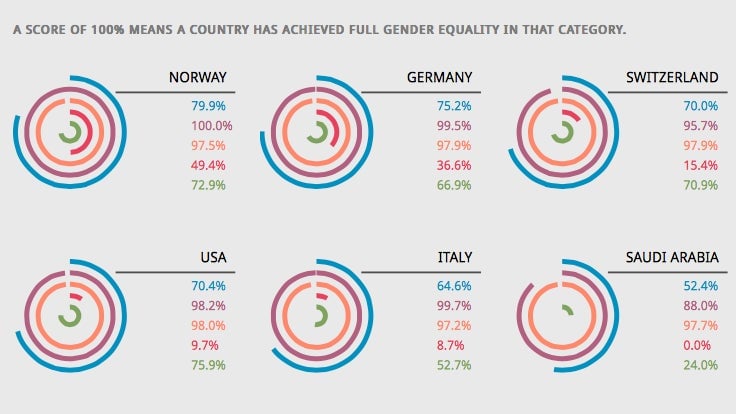Here’s what happened Friday at Davos
Whatever you think about what Davos does, one must acknowledge who Davos attracts: leaders. While it is difficult to measure the impact of connections formed there, or the potential progress from serendipitous partnerships, the promise of such a gathering is inspiring, given our fractured world.


Whatever you think about what Davos does, one must acknowledge who Davos attracts: leaders. While it is difficult to measure the impact of connections formed there, or the potential progress from serendipitous partnerships, the promise of such a gathering is inspiring, given our fractured world.
So before everyone heads home, here’s what came to light during day three at the World Economic Forum.
OPEN BANK It’s been some time since a WEF gathering didn’t include hand-wringing over the European Central Bank, but thanks to other urgent continental challenges the scrutiny shifted this year. During the “Europe at a Tipping Point” panel, German newspaperman Josef Joffe observed that Europe has overcome crisis after crisis, but “now we have about five” as EU politics, economic woes, refugees, and terrorism vie for headlines. ECB President Mario Draghi took the stage a day after a well-received, yet familiar statement that lagging euro area recovery may necessitate a policy divergence from rising interest rates at the US Federal Reserve. UBS chairman Axel Weber commended Draghi’s stance but questioned its potency. “There is clearly no limit to what the ECB is willing to do,” he said. “But there is a limit to what monetary policy can realistically achieve. It may have run its course.”
Draghi also called for European unity in the face of crisis, with Britain undoubtedly on his mind. “Not to cooperate is to ignore the challenge,” he said. International Rescue Committee head David Miliband used the “Tipping Point” panel to ask that Europe deal with state failures rather than reacting to symptoms. “The higher you build the wall, the more you empower the smugglers,” he said.
LEAN MACHINE Facebook COO Sheryl Sandberg kicked off the “Progress towards Parity” panel by explaining that we all hold back gender equality with common expectations. Men are expected to lead, provide, and chase results, she said, while women are expected to nurture, to embrace housework and perform personal favors. Canadian Prime Minister Justin Trudeau, hailed for his historic 50/50 cabinet, incited cheers when he said, “We shouldn’t be afraid of the word feminist. Men and women should use it to describe themselves any time they want.” He advocated for actively shaping our workforce, and our perceptions about it until biases cease, though Sandberg noted that board quotas in places like Norway don’t trickle up or down to the CEO and other management levels. “We shouldn’t be working toward equality because it’s the right thing, but because it’s the smart thing,” she said. Philanthropist and executive Melinda Gates pointed to women as part of the world’s great unpaid labor share, illustrated vividly in this video:
SPACEY LAUNCH The backstage “King of Davos,” Kevin Spacey proved just as captivating in the spotlight. During a half hour interview, he treated the crowd to a range of comedic impressions, a moving description of acting’s ability to humanize, and incisive political commentary. Spacey was most eager to talk about how people can be inspired—everyone from a young woman in his Abu Dhabi acting class to the shy boy he once was himself. In a particularly apt observation for the Davos elite, he concluded by quoting the philosophy of his idol Jack Lemmon: “If you’ve done well in your profession,” Spacey said, “then it’s your obligation to spend a good portion of your time sending the elevator back down.”
KERRY’S KEYS After lamenting that he felt “somewhat deprived” to see powder tracks on the Alps that weren’t his, US Secretary of State John Kerry touted the UN-Iran nuclear deal. He claimed that Iran had been on a “collision course with the international community that in all likelihood would have ended in war.” He also struck an optimistic note on global crises. “When has any generation not been tested?” Kerry asked. “We are staring at extraordinary opportunities wherever we look in the world.” To make progress, he said we must all demand good governance, economic and social opportunity for young people, and the elimination of extremist actors like those who have “hijacked” Islam. The WEF is just the place to start, Kerry said. “People don’t fly to Davos to celebrate the status quo.”
IN YOUR HEAD The “What If: Your Brain Confesses?” panel addressed the possibility of a portable brain decoding device. What would be at stake? “Anything that is in current conscious awareness can potentially be decoded,” said Berkeley professor Jack Gallant. The idea bred anxiety among poll respondents who were asked who they’d trust with such access. Given the choices of government, police, your doctor, your employer, and your spouse, 60% chose “none of the above.” Panelists were apprehensive about neuroscience’s role in the courtroom given the possibility of high stakes and low accuracy, but ethics scholar Nita Farahany saw the potential to improve the legal system in general by detecting biases. And speaking of optimism:
Before we ski off into the sunset for another year, here are a few more links for the trail:
- Michael Bloomberg unveiled a task force on climate change, and UN Secretary-General Ban Ki-moon laid out a new climate imperative.
- South African President Jacob Zuma faces questions over his surprising absence from a panel on Africa’s future.
- Harvard Professor Kenneth Rogoff predicted a political revolution on student debt, while the general profile of protest at Davos seems to have changed.
And now, the always-appropriate Bono Davos outro. Til 2017—Auf Wiedersehen!
This article was produced on behalf of Bank of America by the Quartz marketing team and not by the Quartz editorial staff.